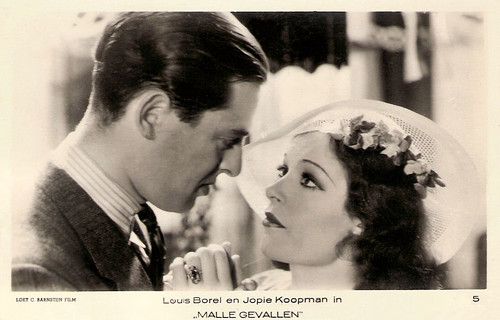
Dutch postcard by M. B.& Z. (M. Bonnist & Zonen, Amsterdam), no. 5. Photo: Loet C. Barnstijn Film. Still for Malle gevallen/Silly Situations (Jaap Speyer, 1934) with Jopie Koopman.
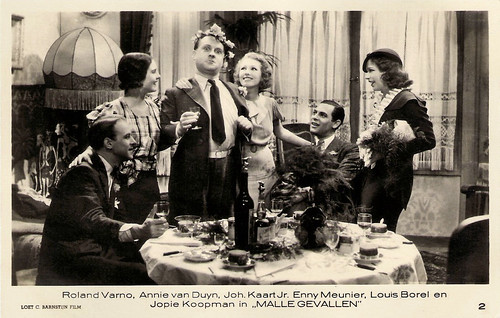
Dutch postcard by M. B.& Z. (M. Bonnist & Zonen, Amsterdam), no. 2. Photo: Loet C. Barnstijn Film. Still for Malle Gevallen/Silly Situations (1934). Collectie: Geoffrey Donaldson Institute.
Silly situations
Louis Borel was born as Lodewijk Borel in Den Haag (The Hague), Netherlands in 1905. He was the son of author and journalist Henri Jean François Borel and his second wife Helena Maria de Hartog. He had two half-sisters and a half-brother. His father had destined Louis to become a banker but the boy chose otherwise.
In 1924, Louis started his stage career as Lodewijk Makkay at the company of famous Dutch actor Cor van der Lugt Melsert. Next, he worked at the Nederlands-Indisch Toneel (Dutch-Indonesian Theatre), led by Cor Ruys, which performed alternately in the Netherlands and the Dutch East Indies. In 1928 he worked with a theatre group which was led by Theo Frenkel jr.
In 1934 he made his film debut in the comedy Malle gevallen/Silly Situations (Jaap Speyer, 1934) based on a novel by Hans Martin. Louis played Hans, one of three students (the others were Johan Kaart and Roland Varno) who date three nice girls (Annie van Duyn, Enny Meunier and Jopie Koopman). In a row, he made three more films. De Kribbebijter/The Cross-Patch (Hermann Kosterlitz aka Henry Koster, Ernst Winar, 1935) was a comedy starring Cor Ruys and Frits van Dongen (a.k.a. Philip Dorn). In the comedy De Suikerfreule/The Sugar Lady (Haro van Peski, 1935) starred Johan Elsensohn and Annie van Duyn. Fientje Peters - Poste restante/Fientje Peters: General Delivery (Victor Janson, 1935) with Dolly Bouwmeester was an alternate language version of the German production Hilde Petersen postlagernd (Victor Janson, 1936).
At the end of 1934, Borel moved to England, where he worked on stage and in the cinema till 1939. He was successful in the play 'Return to Yesterday' and was praised for his charm by British critics. He also acted in the play 'Heart's Content', at the Shaftesbury Theatre in London, with Diana Wynyard, and Anthony Bushell in the cast. Raymond Massey was the director.
British film productions in which he played leading roles were House Broken (Michael Hankinson, 1936), the crime film The Avenging Hand (Victor Hanbury, Frank Richardson, 1937) with Noah Beery, the musical Head Over Heels (Sonnie Hale, 1937) opposite Jessie Matthews, and the Alexander Korda produced comedy Over the Moon (Thornton Freeland, 1939) with Rex Harrison and Merle Oberon. Borel returned shortly to the Netherlands, where he starred in De Spooktrein/The Ghost train (Karel Lamac a.k.a. Carl Lamac, 1939) with Jan Musch and Fien de la Mar. Then he left for the United States.
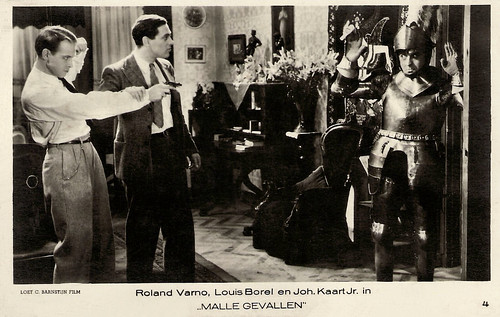
Dutch postcard by M.B.& Z. (M. Bonnist & Zonen, Amsterdam), no. 4. Photo: Loet C. Barnstijn Film. Still for Malle gevallen/Silly Situations (1934) with Roland Varno and Johan Kaart.
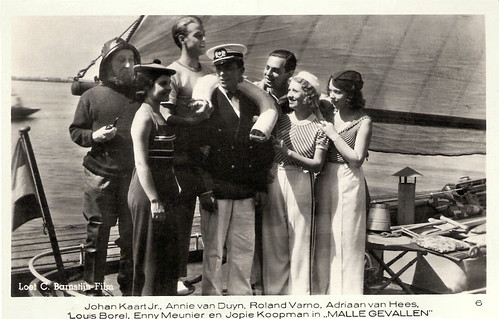
Dutch postcard by M.B.& Z. (M. Bonnist & Zonen, Amsterdam), no. 6. Photo: Loet C. Barnstijn Film. Still for Malle gevallen/Silly Situations (1934).
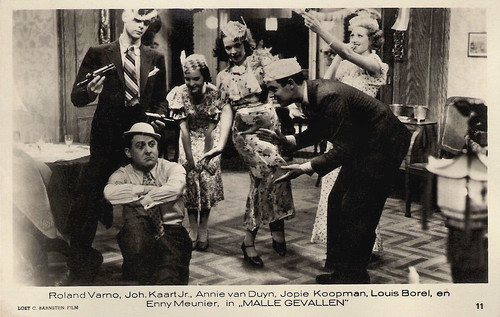
Dutch postcard by M.B.& Z. (M. Bonnist & Zonen, Amsterdam), no. 11. Photo: Loet C. Barnstijn Film. Still for Malle Gevallen/Silly Situations (1934). Collection: Geoffrey Donaldson Institute.
Hollywood
Louis Borel stayed in the US for ten years. First, he appeared in small roles in Hollywood productions like Foreign Correspondent (Alfred Hitchcock, 1940) and the anti-Nazi film Paris After Dark (Léonide Moguy, 1943). Billed as Louis Borell, he had bigger roles in B-films like London Blackout Murders (George Sherman, 1943) and A Night of Adventure (Gordon Douglas, 1944). He also played several stage roles, including in 'Candle in the Wind' and 'Made in Heaven'.
In 1949 Louis Borel returned to the Netherlands but regularly appeared in American TV shows like Passport to Danger, Crusader, Topper, and Those Whiting Girls. He also played bit parts in the films Desirée (Henry Koster, 1954) with Marlon Brando, and The Purple Mask (H. Bruce Humberstone, 1955) starring Tony Curtis.
In The Netherlands, Borel often worked as a stage director, and in 1955 he had his own company De Blijspelers. He also translated and adapted many plays. He appeared in the Dutch crime films 10.32/Murder in Amsterdam (Arthur Dreifuss, 1966) starring Linda Christian, and Because of the Cats (Fons Rademakers, 1973) with Bryan Marshall and Sylvia Kristel.
At the end of his career, he became a popular TV star in the Netherlands for his role as the mayor in the legendary Dutch children's TV series Swiebertje (1970-1972) starring Joop Doderer as the tramp Swiebertje. Other TV series in which he appeared were Een Koekoek op het nest/The Cuckoo’s Nest (1965-1966), De Klop op de Deur/The Knock on the Door (1970-1971), and the children’s series De Vloek van Woestewolf/The Curse of Woestewolf (1973-1974).
Louis Borel died in 1973 in Amsterdam. In his last years, he suffered from Parkinson's and he was unable to control his mouth muscles. His last role had been in the TV play Hier stierf Anna Tholen/Here Died Anna Tholen, which was broadcasted posthumously. Borel was married to Jantje Stanneveld and they had a daughter, Fernanda Borel.
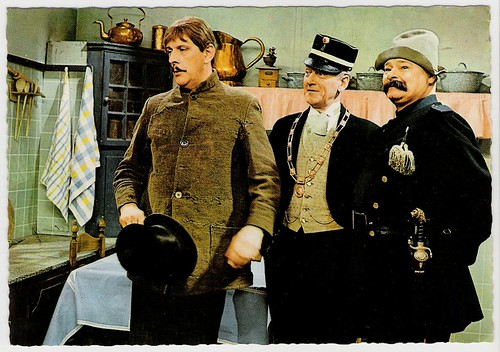
Dutch postcard. Photo: Joop Doderer, Rien van Nunen (who replaced Borel after his death as the mayor) and Lou Geels in Swiebertje.
Scene from Head Over Heels (1937) with Jessie Matthews. Source: guggle 86 (YouTube).
Sources: Wikipedia (Dutch), My Heritage, Swiebertje.tv (Dutch) and IMDb.
This post was last updated on 8 July 2023.
No comments:
Post a Comment